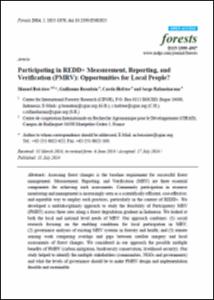déboisement
AGROVOC URI:
Not Always More Trees Means More Water
For many decades, concerned by the undeniable deforestation data, environmental management hasincluded re-vegetation activities in unforested areas intended to (re)create a forest environment.
Panduan investigasi dan penuntutan dengan pendekatan hukum terpadu
Meningkatnya laju deforestasi secara signifikan selama kurun waktu 1970-an sampai tahun 2000-an berdampak pada semakin tingginya desakan terhadap penegakan hukum kejahatan kehutanan yang lebih efektif dan komprehensif. Umumnya penanganan tindak pidana di bidang kehutanan hanya diproses berdasarkan ketentuan dalam Undang-Undang Kehutanan. Beberapa laporan dan hasil studi menyebutkan bahwa penanganan tersebut kurang efektif dalam menghentikan tindak pidana kehutanan.
Participating in REDD+ Measurement, Reporting, and Verification (PMRV): Opportunities for Local People?
Assessing forest changes is the baseline requirement for successful forest management. Measurement, Reporting, and Verification (MRV) are three essential components for achieving such assessments. Community participation in resource monitoring and management is increasingly seen as a scientifically efficient, cost-effective, and equitable way to employ such practices, particularly in the context of REDD+. We developed a multidisciplinary approach to study the feasibility of Participatory MRV (PMRV) across three sites along a forest degradation gradient in Indonesia.
Policy recommendations
This final chapter of the book offers a set of policy recommendations. It presents some typical win-win outcomes, including technologies suited for forest poor areas, labour intensive technologies promoting intensification to replace land extensive farming practices, and promoting agricultural systems that provide environmental services similar to those of natural forests.
Potential environmental impacts
As the problems of impact assessement are rather intractable, a fairly simple dual approach is proposed. First the major components of environmental impact of current agricultural production systems in Africa (i.e. impact of cropping, livestock keeping, fuelwood and timber extraction and burning) are summarised. Second, "danger zones" in which current and future environmental impacts will be most severe and on which ILCA has focused its problem solving-research is identified.
Policy options to reduce deforestation
Four types of policies could reduce deforestation: policies to depress agricultural rent, policies to increase and capture forest rent, policies that directly regulate land use, and cross-sector policies that underpin the first three. While payments for environmental services (PES) have clear advantages, in the early stages of REDD+ implementation, broader policies which address underlying causes are more feasible and likely to be more successful. REDD+ is a new direction in forest conservation.
Poverty mapping: Central Peruvian Amazon: Alternative poverty mapping method
Quand le syndrome Neerlandais: petrole, macroeconomie et forets au Gabon
Gabon’s oil wealth coincides with the fact that it is one of the most forested countries in Africa; about four-fifths of its land area is covered by forests. But this is not really a coincidence. The central hypothesis of this report is that oil rents have enabled a series of pro-urban, anti-rural policies that, together with the low demographic pressure, have been key in protecting forests from degradation and deforestation. In particular, forest conversion to cropland has been contained. Most probably, oil has helped expand forest cover in absolute terms.


